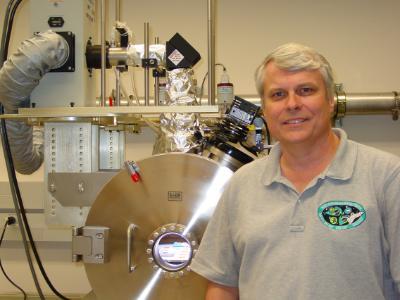Dr. Andrew Schuerger
Assistant Professor

Contact:
Email: schuerg@ufl.edu
Office: Space Life Sciences Lab,
505 Odyssey Way,
Exploration Park,
Merritt Island, FL 32953
About
Dr. Andrew C. Schuerger received his BS (1979) and MS (1981) degrees from the University of Arizona and his Ph.D. (1991) from the University of Florida studying microbiology and plant pathology. His dissertation studied the effects of temperature and pH on spore attachment of the fungal pathogen, Fusarium solani f. sp. phaseoli, to roots of mung bean plants grown in hydroponic systems. Dr. Schuerger worked for 18 years (1982-2000) at The Land, Epcot Center, FL (a hydroponic research and education facility) developing disease management programs for viral, bacterial, fungal, and nematode diseases of vegetable and agronomic crops. His research interests have closely paralleled NASA’s Advanced Life Support (ALS) and Astrobiology programs in which he has published numerous papers on plant-pathogen interactions in semi-closed plant growing systems, survival of terrestrial microorganisms under Martian conditions, and microbial ecology of human missions to Mars. In 1997 Dr. Schuerger joined the Dynamac Corporation (a NASA contractor at the Kennedy Space Center, FL specializing in environmental and life sciences) to pursue research on the remote sensing of plant stress, Mars astrobiology, and ALS plant pathology issues. In 2003 Dr. Schuerger joined the Dept. of Plant Pathology at the University of Florida as a Research Assistant Professor to continue his Mars astrobiology and ALS research activities.
His current research efforts include:
- Studying the effects of martian conditions on the survival, growth, and adaptation of terrestrial microorganisms
- Investigating the UV-photolytic generation and destruction processes of methane on Mars, a potential biosignature molecule in the martian atmosphere
- Developing a dust collection system called DART (Dust Atmospheric Recovery Technology) to recover plant and human pathogens in African dust plumes that annually hit FL
- Characterizing the development of plant pathogens in bioregenerative Advanced Life Support (ALS) systems.
-
Education
Ph.D. Plant Pathology, University of Florida, 1991
M.S. Microbiology, University of Arizona, 1981
B.S. Microbiology, University of Arizona, 1979
-
Research
Top 8 Research Findings:
- Tomato mosaic virus (ToMV) can be transported in hydroponic nutrient solutions (Schuerger & Hammer, 1995).
- Developed a successful biocontrol program for root-knot nematodes by the bacterium, Pasteuria penetrans (Serracin et al., 1997).
- Plants can grow at very low pressures (10% sea level) (Richards et al., 2006).
- Microorganisms on spacecraft are killed-off within 3 h on Mars (Schuerger et al., 2003; 2005; 2006; 2008).
- Filtration does not fully remove spores of fungal pathogens in hydroponic systems (Schuerger & Hammer, 2009).
- Methane on Mars (≤ 2 ppb) can be generated by the UV irradiation of meteoritic organics (Schuerger et al., 2011, 2012; Moores and Schuerger, 2012).
- Twenty-nine species of bacteria have been identified that can grow under Martian conditions of 7 mbar, 0 oC, and CO2 anoxic atmospheres (Schuerger et al., 2013; Nicholson et al., 2013; Schuerger and Nicholson, 2016).
- Asian dust does not appear to transport soilborne fungal pathogens to the USA (Schuerger et al., 2012; in preparation).
-
Publications
You can view a list of Dr. Shuerger's publications on ResearchGate.
